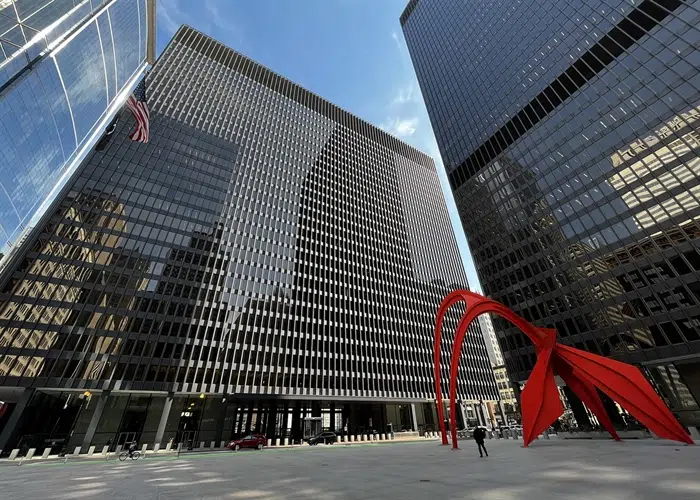Utility’s longtime lobbyist gives interpretation of wiretapped calls
By HANNAH MEISELCapitol News Illinoishmeisel@capitolnewsillinois.com
CHICAGO – After nearly six weeks, a federal jury has heard almost all the evidence in the bribery trial of three ex-lobbyists for electric utility Commonwealth Edison and its former CEO who are accused of bribing former Illinois House Speaker Michael Madigan.
Prosecutors allege the four arranged for Madigan allies to get jobs and contracts with ComEd in exchange for the powerful speaker’s help with their legislation in Springfield. Defendants contend they were merely engaging in above-board lobbying.
Attorneys for three of the four defendants rested their case Wednesday afternoon, while the marquee defendant in the case, Madigan confidant and longtime ComEd lobbyist Mike McClain, indicated he would not be calling any witnesses. The jury will begin hearing closing arguments on Monday.
On Thursday, prosecutors and defense lawyers will negotiate over jury instructions, which could be key to the outcome of the case.
“I am optimistic, perhaps more so than you guys, that it will be a smooth instruction conference,” Judge Harry Leinenweber quipped to the parties after the jury had been sent home Wednesday.
Earlier in the day, longtime ComEd lobbyist John Hooker finished hours of testimony that had the jury laughing when he underwent questioning from his own attorney, followed by a withering cross-examination from the government.
At one point during questioning from Assistant U.S. Attorney Julia Schwartz, Hooker contradicted the testimony of codefendant Anne Pramaggiore, ComEd’s former CEO. At issue was a wiretapped call featuring Hooker and former ComEd executive Fidel Marquez, recorded in the third month of Marquez’s cooperation with the government in April 2019.
In the call, Hooker related to Marquez that he’d spoken with Pramaggiore about hiring Madigan’s former chief of staff, who the speaker had been forced to fire the previous year after sexual harassment allegations. At the time, Pramaggiore had already been in her new role at ComEd’s parent company, Exelon, for nearly a year.
“I was talking with Anne and she told me that she’s looking at…bringing Mapes on,” Hooker told Marquez. “Now Mapes would work with her, cause she says, ‘I wanted to kinda, well let’s pay him but hide his contract in someone else’s.’”
On Tuesday, Pramaggiore confirmed that she had been considering hiring Mapes for a national project she was working on, although she ultimately never did. However, she claimed she never told Hooker she wanted to “hide” Mapes’ contract in a subcontracting arrangement. Subcontracting is not illegal.
“No, I have no recollection of having a conversation like that with Mr. Hooker,” Pramaggiore said.
But one day later, Hooker was confronted with that same call.
“Did you hear Ms. Pramaggiore testify yesterday that that conversation didn’t happen?” Schwartz asked Hooker. “Was Ms. Pramaggiore telling the truth about that?”
Hooker replied that “to the best of my recollection,” he and Pramaggiore did talk about putting Mapes on a consulting contract with McClain, as he’d said in the recorded phone call.
“You wouldn’t have lied to Mr. Marquez about what Ms. Pramaggiore told you, would you?” Schwartz asked.
“No, I would not lie,” Hooker said.
The jury has at this point heard from nearly 50 witnesses, dozens of recordings from wiretapped phone calls, four videos secretly recorded by Marquez, and hundreds of emails and texts. Both the government and defense have used them to educate the jury on the nature of lobbying and the reality of political work in Illinois. And, as McClain attorney Patrick Cotter warned them in his opening arguments, “some of it is not pretty.”
“Why?” Cotter said in mid-March when the trial began. “Because politics…can be raw, politics can be ugly.”
But in addition, the defense has also emphasized the monotony, hard work and frustration that goes into lobbying for the sorts of big-ticket legislation at issue in the case. Numerous witnesses testified that it took two to three years for two of the biggest bills supported by ComEd in the last decade or so to evolve from ideas on paper into law.
And sometimes, Cotter emphasized Wednesday, the brass tacks of politics and strategy in Springfield can be rather boring, if not simplistic: The thing Madigan valued most in politics was remaining speaker of the Illinois House.
“Mr. Hooker, after all those decades [of lobbying in Springfield]…did you ever, at any point, believe it was possible that Speaker Madigan would agree to trade his support for ComEd legislation in exchange for some jobs for some people he recommended?” Cotter asked. “Did you ever believe that was possible?”
Hooker said he did not.
“Did you ever believe for one minute that Speaker Madigan would risk his speakership and his power to get a few more people hired at ComEd…on a bill that the whole state was watching?” Cotter asked, his voice rising.
Again, Hooker said he did not.
Cotter asked if Hooker would’ve ever advised ComEd to bribe Madigan – “did you think that was a good idea?”
No, Hooker said.
“It was crazy, wasn’t it?” Cotter said.
“It’s a bad idea,” Hooker said.
The fourth defendant in the case, ComEd lobbyist Jay Doherty, only called one witness in his case: The Rev. Monsignor Kenneth Velo, who testified he wouldn’t be in the courtroom as Doherty’s sole character witness “if I didn’t think of John as a man of complete integrity.”
The two knew each other from Chicago’s philanthropic scene, overlapping on missions such as Misericordia and the Big Shoulders Fund. Velo, an ordained Catholic priest, is also an administrator at DePaul University.
The jury will return for closing arguments in the trial at 10 a.m. Monday.
Capitol News Illinois is a nonprofit, nonpartisan news service covering state government. It is distributed to hundreds of newspapers, radio and TV stations statewide. It is funded primarily by the Illinois Press Foundation and the Robert R. McCormick Foundation, along with major contributions from the Illinois Broadcasters Foundation and Southern Illinois Editorial Association.


